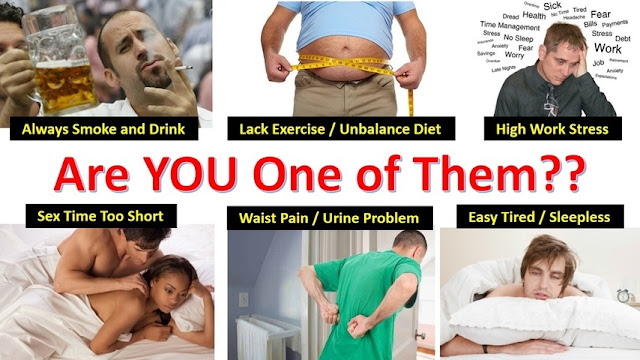The term Nocturia, as a symptom, is generally used to mean that the patient is waking to pass urine more frequently than normal per night. If this happens more than twice a night, it can be a problem. Nocturia is common in older people. Research shows two out of three men, aged 50 years old and above have a problem with night urination.
Frequent urination is not a symptom of a problem, but is the
problem. In people with overactive bladder syndrome, involuntary bladder
contractions lead to frequent and often urgent urination, meaning you have to
get to a bathroom right now -- even if your bladder is not full. It may also
lead you to wake up once or more during the night to use the bathroom. Wake up
too often at night can cause problems in day-to-day life. Some people may not
be able to get back to sleep after wake up at night. It has significant impact
on quality of sleep and quality of life.
 Frequent urination can be a symptom of many different
problems. When frequent urination is accompanied by fever, an urgent need to
urinate, and pain or discomfort in the abdomen, you may have a urinary tract
infection. Other possible causes of frequent urination include:
Frequent urination can be a symptom of many different
problems. When frequent urination is accompanied by fever, an urgent need to
urinate, and pain or discomfort in the abdomen, you may have a urinary tract
infection. Other possible causes of frequent urination include:
1. Diabetes.
Frequent urination with an abnormally large amount of urine is often an early
symptom of both type 1 and type 2 diabetes
as the body tries to rid itself of unused glucose through the urine.
2. Prostate problems. An enlarged prostate can press against the urethra (the tube
that carries urine out the body) and block the flow of urine. This causes the bladder
wall to become irritable. The bladder begins to contract even when it contains
small amounts of urine, causing more frequent urination.
3. Interstitial
cystitis. This condition of unknown cause is characterized by pain in the bladder and pelvic region. Often, symptoms include an urgent and/or
frequent need to urinate.
4. Medication.
These medications that are used to treat high blood pressure or fluid build work
in the kidney and flush excess fluid from the body, causing frequent urination.
5. Stroke
or other neurological diseases. Damage to nerves that supply the
bladder can lead to problems with bladder function, including frequent and
sudden urges to urinate.

6. Congestive Heart Failure. During the day, fluid accumulates in the legs due to gravity and the heart’s
inability to pump normally. When we lie down at night, this fluid, without the
influence of gravity, re-enters the blood stream and causes an increase in
urine production.
7. Aging. Increased age has been
associated with decreased bladder capacity, as well as a tendency of bladder
muscles to become overactive.
8. Alcohol and Caffeine. Late
night ingestion of either of these can cause Nocturia that ruins sleep.
9. Excessive Fluid Intakes. Some people used to consume
more than 30% of their fluids after dinner. Restricting the amount of fluids
close to bedtime and encouraging earlier consumption may alleviate the problem.
10. Obesity. We are not sure why,
but in several studies, obesity, especially abdominal obesity, has been
associated with an increased incidence of night time urination.
It is important that any causes of Nocturia get treated or
that you are referred to the right specialist. Some of the health professionals
you may be referred to can include a continence physiotherapist, continence
nurse advisor, urologist or renal physician. However treatment for frequent urination
will address the underlying problem that is causing it. For example, if diabetes is
the cause, treatment will involve keeping blood sugar levels under
control.
1. Diet modification. You should avoid any food that
appears to irritate your bladder or acts as a diuretic. These may include caffeine,
alcohol, carbonated drinks, tomato-based products, chocolate, artificial
sweeteners, and spicy foods. It's also important to eat
high-fiber foods, because constipation may
worsen the symptoms of overactive bladder syndrome.
2. Monitoring
fluid intake. You should drink enough to prevent constipation and
over-concentration of urine, but you should avoid drinking just before bedtime,
which can lead to night time urination.
3. Exercises. These
exercises help strengthen the muscles around the bladder and urethra to improve
bladder control and reduce urinary urgency and frequency. Exercising pelvic
muscles for five minutes three times a day can make a difference in bladder
control.
4.Wearing suitable underwear. A cotton brief
underwear with magnetic force might help in good blood circulation.
5. Lighting your path to the toilet (such as a
night light) to avoid fall.
6. Placing a commode or bright coloured bucket for
use at the bedside.












